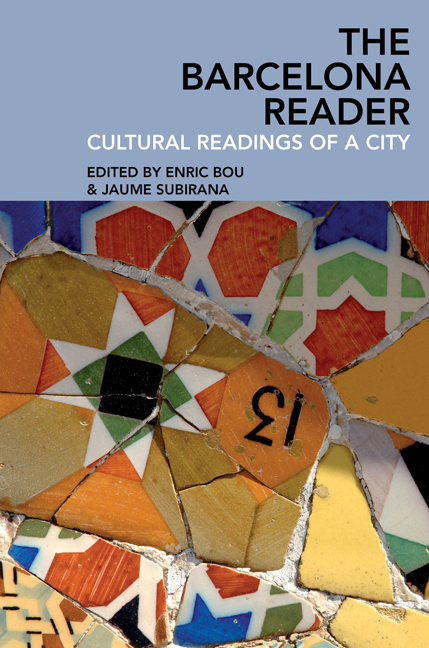Book contents
- Frontmatter
- Contents
- List of illustrations
- Notes on contributors
- Introduction: Barcelona: Cultural readings of a city
- I City, history, and territory
- II City and society
- III Art, architecture, and the city
- IV The Olympics and the city
- 13 Barcelona: Urban identity 1992–2002
- 14 From the Olympic torch to the Universal Forum of Cultures: The after-image of Barcelona's modernity
- V Literature, cinema, and the city
13 - Barcelona: Urban identity 1992–2002
from IV - The Olympics and the city
- Frontmatter
- Contents
- List of illustrations
- Notes on contributors
- Introduction: Barcelona: Cultural readings of a city
- I City, history, and territory
- II City and society
- III Art, architecture, and the city
- IV The Olympics and the city
- 13 Barcelona: Urban identity 1992–2002
- 14 From the Olympic torch to the Universal Forum of Cultures: The after-image of Barcelona's modernity
- V Literature, cinema, and the city
Summary
Across the European continent cities are being transformed, reconfigured, reoriented, reimaged. Barcelona, a city that was long constrained by a Francoist straitjacket, now bears little resemblance to the gaudy guidebooks of the 1960s and 1970s with their lurid images of the Sagrada Família, their dusty statues of Columbus, the golondrines bravely navigating the working port. The city has been, in no particular order, catalanized, globalized, informationalized, gentrified, redesigned, and Europeanized. Its sounds and smells have changed; some streets have gone and others have arrived; high buildings have soared above the two-story housing in Hostafrancs and Poblenou. The Ciutat Vella (Old City) and the Barrio Chino (Chinatown) are, contrary to some opinion, as vital as ever. And all around, in virtual and territorial spaces, the city is being pulled open and stretched wide by fibreoptic cables, an ever-expanding airport, rondes (expressways) and a high-speed train network. The city is unbound, snaking beyond its municipal limits into the valleys and along the north and south coast, and it is disembedded, feeding on the skill of its football team and the aesthetics of its architects, its icons projected globally by the media.
There have been dramatic changes, yet all taking place against an unusually stable backdrop of social democratic governance, where a centre-left coalition has been in power in the city council since 1979. In this chapter I want to explore how some of the diverse processes mentioned above might be related to issues of urban identity, and how interventions in the urban landscape are intimately political. I want to reflect on the city's emergence from dictatorship through the Olympic phase, where the urban left (in a range of guises) found itself having to rethink how its politics fitted the changing city and how the city, in turn, fitted the transformation of the political options of the centre-left. After briefly tracing the evolution of this relationship, I discuss the changing nature of the old town, the growing dogma of a technologically modernized city, the impact of deterritorialization on the city's icons, primarily its football club, and finally draw some comparisons between the 1992 Olympics and the city's next ‘megaevent’, planned for 2004.
- Type
- Chapter
- Information
- The Barcelona ReaderCultural Readings of a City, pp. 323 - 346Publisher: Liverpool University PressPrint publication year: 2017



